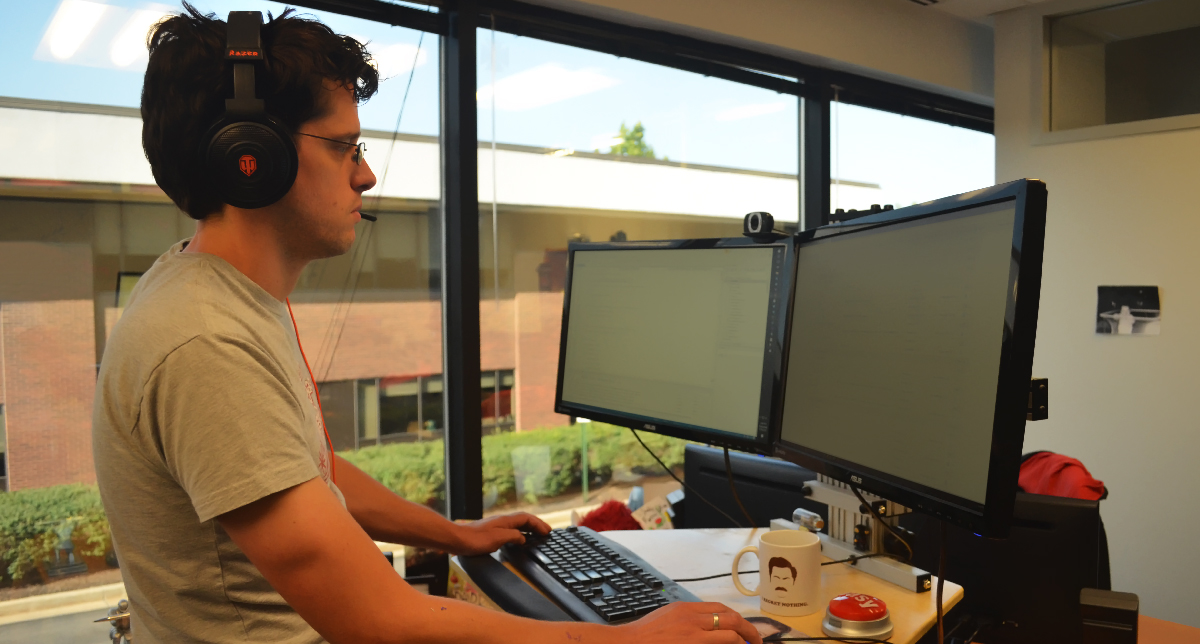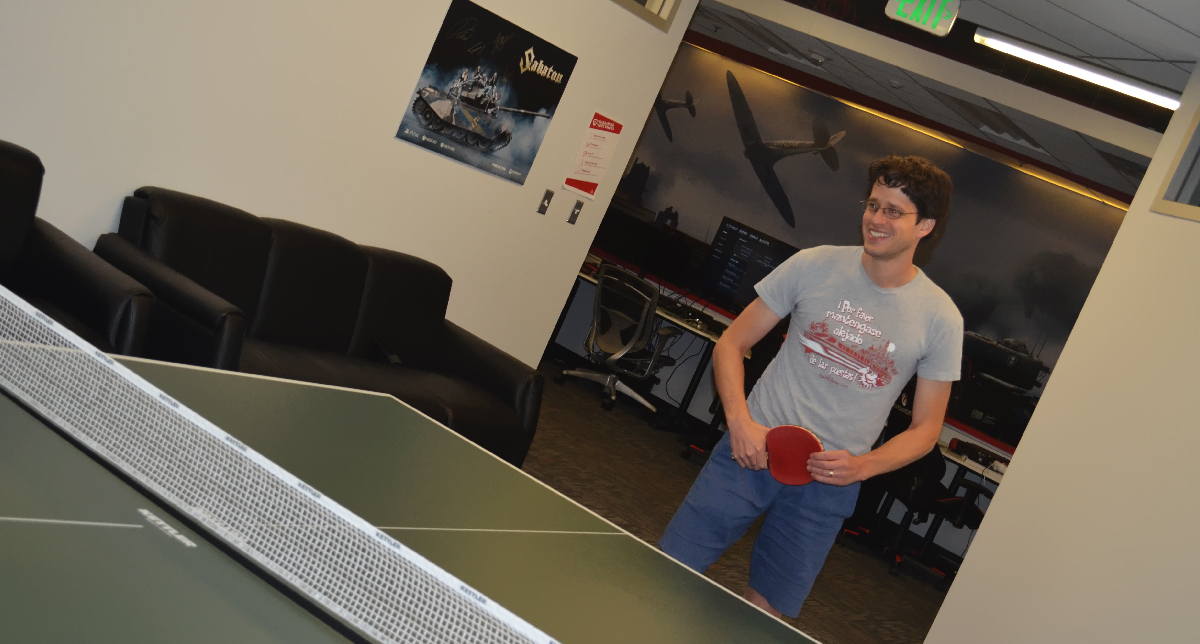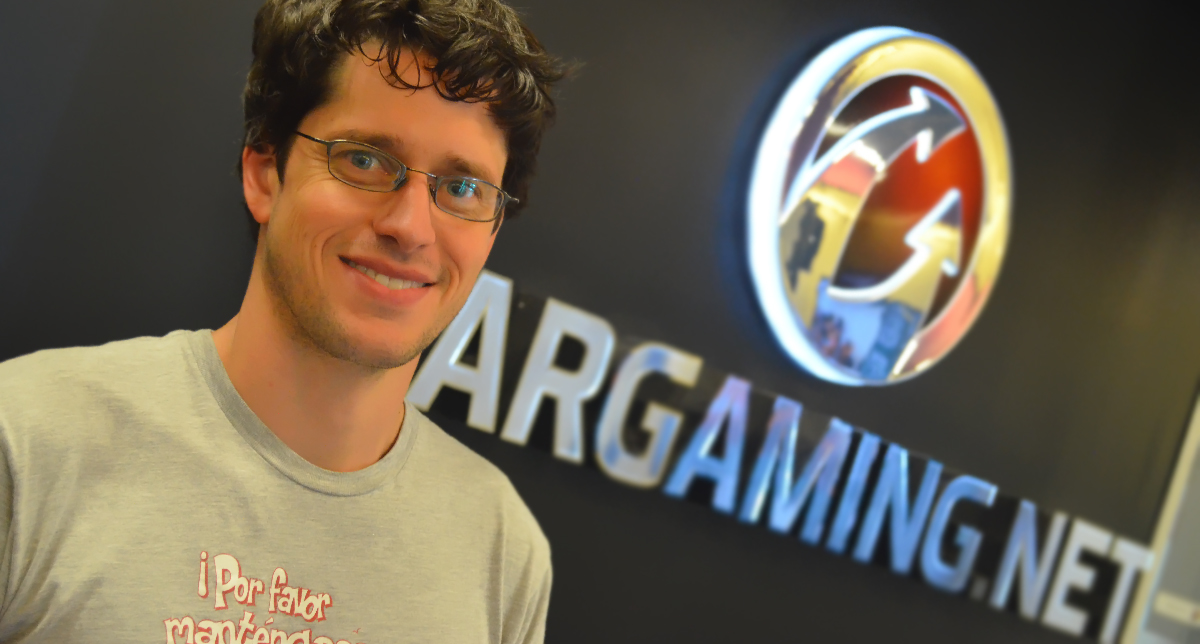Baltimore, known as “Charm City”, is a diverse and storied location for one of Wargaming’s video game development studios. With a rich history, Baltimore boasts a spectacular arts and music scene. I recently had the pleasure of learning more about how we optimize the Video Game development process from one of Wargaming’s Build Engineers, Shawn Westin.

To start, could you tell me about your background and how you ended up at Wargaming?
My background is in Computer Science. Before Wargaming, I worked at a financial firm doing Automation development and optimizing the build process.
My transition to Wargaming was unexpected. My teammate had worked at the financial firm with me. We stayed in contact after he came to Wargaming, and he said it was the “best thing ever”. So, I ended up following him here.
What challenges do you face as a Build Engineer?
I am a Build Engineer. We work on automating all aspects of the development pipeline; anything that’s not creative, that can happen automatically.
Our task is also figuring things out. We work in a lot of different [programming] languages and technologies. Every day brings something different - be it Windows, Linux, Python, C#, Java or C++. We investigate when things break [in the game build], how it broke, how we can fix it, and how we can engineer a solution or fix the framework to prevent it from happening again.
We aim to help the development team avoid wasting time on problems that can be prevented.
What’s something you’re really proud of?
Automating the DiscBuild process [a process to pull together all the parts of the game into a shippable format] is one accomplishment that I am really proud of. That was a big one. We were able to leverage TeamCity [our development continuous integration server] to make the DiscBuild pipeline more consistent and visible with less maintenance.
For those who aren’t familiar with the Automation process from a development standpoint, could you shed some light on what that looks like?
It starts with source control- we use Perforce [a software solution to track every change made to the game]. We tightly version everything. It’s essentially a differential from one version of the build to the next so that everybody can work and effectively integrate everyone’s changes on top of each other.

We use TeamCity to monitor the changes in Perforce and rebuild the game several times a day to make sure all the changes fit together. When one change breaks something we know about it quickly, and automated notifications are set up so that the right people get notified. We limit the amount of unnecessary notifications by automatically scanning the logs for errors and cross-referencing with the last user to touch the offending file(s).
We engineer automation everywhere it’s appropriate. We assess which processes are best to automate- generally those that are repetitive, time consuming and/or error prone.
What’s life like in Baltimore?
Life is good. Baltimore is a small city so it’s a little bit more laid back than the hustle and bustle of Chicago. It’s nice. I’m an outdoors fan, and we have a lot of outdoor activities here like mountain biking, rock climbing, and kayaking. We’re right on the water so there are a lot of activities you can do in the Chesapeake Bay, and “down the Ocean”[Baltimore’s seaside] .
There is a lot of diversity and culture, so it’s a good well-rounded place to live in.
What does your ideal weekend look like?
I would say taking the kids out on a bike ride. We have a lot of rails to trails, which are old train tracks that have been converted to bike trails. It’s fun biking through the woods with the family.
How do you handle the work life balance between work and family?
Wargaming is good about that. In my position, there are things that need to get done during the day. I can also login from home when things come up outside of core hours. I don’t usually have crazy long days at the office, generally speaking, which allows me to come in to work every day refreshed and focused on the task at hand.
What’s the culture like in the Baltimore Office?
It’s a lot of fun. We work hard, and we play hard. We have been known to play a game of ping pong here or there, and we have office video game tournaments once every couple of months.

I heard you’re probably one of the best players between the Chicago and Baltimore offices, is that true?
[Laughter] I was visiting the Chicago office last year, and I managed to eke out a couple wins there. That’s probably how that rumor started. There are several people who are really good, which makes for balanced competition every game.
What’s your team like?
I work on the Build team- which is a small team. We’re two Build Engineers plus our fearless leader. We work well together and just take care of business.
We’ve always got each other’s backs and we complement each other’s skillsets. We’re big fans of doing code reviews, which is facilitated by Swarm, our code review platform. Every change gets a second set of eyes before it goes in.

Why do you stay at Wargaming?
It’s a lot of fun, and I enjoy coming to work. I look forward to Monday as much as I look forward to Friday. My work is interesting- it’s like solving puzzles every day.
I get to work with really smart people. Everybody I work with motivates me to step up my game. It is one of the major benefits that I feel doesn’t get talked about enough. I never feel like I need to pick up anybody else’s slack because no one is slacking. Everybody’s here because they deserve to be here. They work hard, and they care about the details. I find that to be a very underappreciated benefit.
Wargaming as a company looks out for and respects everyone. It’s a great place to work.
What does it take to be a Wargamer?
It takes being excellent at what you do to get an interview- it takes being passionate about what you do to join the team.
Wargaming Baltimore is growing, and we’re currently hiring! Learn more about what we do, and find your dream job. Apply today!